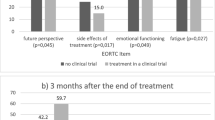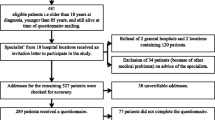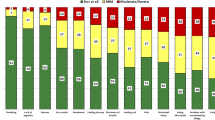Abstract
In a population-based study, the Nordic Myeloma Study Group found a survival advantage for high-dose melphalan with autologous blood stem-cell support compared to conventional chemotherapy in myeloma patients under 60 yr of age (risk ratio: 1.62; confidence interval [CI] 1.22–2.15; p=0.001). A study of health-related quality of life (HRQoL) was integrated in the trial, using the EORTC QLQ-C30 questionnaire. Of the 274 patients receiving intensive therapy 221 (81%) were compared to 113 (94%) of 120 patients receiving conventional melphalan-prednisone treatment.
Prior to treatment, there were no statistically significant differences in any HRQoL score between the two groups. One month after the start of induction chemotherapy, the patients on intensive treatment had more sleep disturbance than the control patients. At 6 mo, corresponding to a mean of 52 d after high-dose melphalan, the patients on intensive treatment had moderately lower scores for global QoL and role and social functioning and there was also a significantly higher score for appetite loss. At 12 and 24 mo, the HRQoL was similar to that of the control patients. At 36 mo, there was a trend toward less fatigue, pain, nausea, and appetite loss in the intensive-treatment group. Thus, the 18 mo of prolonged survival seem to be associated with a good health-related quality of life. Despite the moderate HRQoL reduction associated with the early intensive chemotherapy phase, this treatment modality must be regarded as an important step forward in the care of multiple myeloma.
Similar content being viewed by others
References
Wisloff, F., et al. (1996). Measurement of health-related quality of life in multiple myeloma. Br. J. Haematol. 92:604–613.
Hjorth, M., et al. (1999). Survival in conventionally treated younger (< 60 years) multiple myeloma patients: no improvement during two decades. Eur. J. Haematol. 62: 271–277.
The Myeloma Trialists’ Collaborative Group. (1998). Combination chemotherapy versus melphalan plus prednisone as treatment for multiple myeloma: an overview of 6,633 patients from 27 randomized trials. J. Clin. Oncol. 16:3832–3842.
Attal, M., et al. (1996). A prospective, randomized trial of autologous bone marrow transplantation and chemotherapy in multiple myeloma. N. Engl. J. Med. 335:91–97.
Barlogie, B., et al. (1997). Superiority of trandem autologous transplantation over standard therapy for previously untreated multiple myeloma. Blood 89:789–793.
Lenhoff, S., et al. (2000). Impact on survival of high-dose therapy with autologous stem cell support in patients younger than 60 years with newly diagnosed multiple myeloma: a population-based study. Blood 95:7–11.
Hjorth, M., et al. (1996). Interferon-α 2b added to melphalan-prednisone for initial and maintenance therapy in multiple myeloma. Ann. Intern. Med. 124:212–222.
Wisløff, F., Hjorth M., Kaasa, S. and Westin, J. (1996). Effect of interferon on the health-related quality of life of multiple myeloma patients: results of a Nordic randomized trial comparing melphalan-prednisone to melphalan- prednisone + α-interferon. Br. J. Haematol. 94:324–331.
Aaronson, N.K., et al. (1993). The European Organization for Research and Treatment of Cancer QLQ C-30: a quality of life instrument for use in international clinical trials in oncology. J. Natl. Cancer Inst. 85:365–376.
Kaasa, S., et al. (1995). The EORTC Core Quality of Life Questionnaire (QLQ C-30): validity and reliability when analyzed with patients treated with palliative radiotherapy. Eur. J. Cancer 31A:2260–2263.
Hjermstad, M.J., Fossa, S.D., Bjordal, K. and Kaasa, S. (1996). Test/retest study of the European Organization for Research and Treatment of Cancer core quality of life questionnaire. J. Clin. Oncol. 13:1249–1254.
Fayers, P., Aaronson, N., Bjordal, K. and Sullivan, M. (1995). EORTC QLQ C-30 Scoring Manual, EORTC Study Group on Quality of Life, Brussels.
King, M.T. (1996). The interpretation of scores from the EORTC quality of life questionnaires QIQ-C30. Qual. Life Res. 5:555–567.
Osoba, D., Rodrigues, G., Myles, J., Zee, B. and Pater, J. (1998). Interpreting the significance of changes in health-related quality-of-life scores. J. Clin. Oncol. 16:139–144.
Altman, D.G. (1991). Practical Statistics for Medical Research. Clinical Trials: Sample Size, pp. 455–460, Chapman & Hall, Cornwall, UK.
Henon, P., Donatini, B., Eisenmann, J.C., Becker, M. and Beck-Wirth, G. (1995). Comparative survival, quality of life and cost-effectiveness of intensive therapy with autologous blood cell transplantation or conventional chemotherapy in multiple myeloma. Bone Marrow Transplant 16:19–25.
Author information
Authors and Affiliations
Consortia
Corresponding author
Rights and permissions
About this article
Cite this article
Gulbrandsen, N., Wisløff, F., Brinch, L. et al. Health-related quality of life in multiple myeloma patients receiving high-dose chemotherapy with autologous blood stem-cell support. Med Oncol 18, 65–77 (2001). https://doi.org/10.1385/MO:18:1:65
Received:
Accepted:
Issue Date:
DOI: https://doi.org/10.1385/MO:18:1:65




